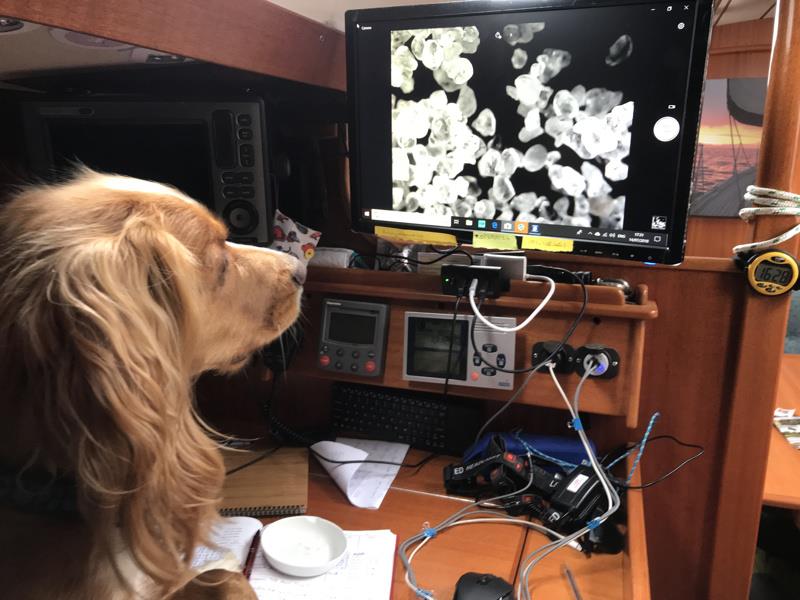
Sailors can help in a survey to save our oceans from toxic chemicals and microplastics
by Daria Blackwell 16 Nov 2021 09:08 UTC

Counting plankton and microplastics © Dr Dryden
Edinburgh-based marine biologist, Dr Howard Dryden, started the Global Oceanic Environmental Survey (goesfoundation.com) to tackle the root causes of climate change - loss of plankton in our oceans.
Arresting climate change is not just about reducing carbon dioxide and methane emissions. Climate activist, Dr. Howard Dryden, CSO, GOES Foundation delivered a webinar to OCC members to explain basic research that shows that tackling a major cause of climate change is our only hope. Howard and his wife Diane cruise on their HR43, Copepod, collecting and analysing water samples as they go. Howard describes the threats to our oceans and what can be done to protect our planet.
Dr Howard Dryden has studied water pollution, water filtration and the delicate chemistry of marine habitats all his life. He describes the scale and toxic consequences of marine plastic pollution as well as the consequences of the acidification of the oceans. He contends that nature will quickly recover if the world can stop polluting.
Arresting climate change is not just about reducing carbon dioxide and methane emissions. According to Dr Dryden, "Plankton in our oceans are the true lungs of the planet, and 80% of them will be gone due to pollution by 2045." It is the dying plankton that normally lives in harmony with corals that is causing the bleaching of reefs. We humans are at fault as a result of the chemicals and microplastics we release into the environment when we wash ourselves, our clothes, and our property. These end up in the oceans because they are not filtered out of the treated wastewater. We also use toxic sunscreens and makeup products that protect our skin from burning but cause reefs to die.
The GOES Foundation is about helping to deliver solutions to protect plankton by eliminating chemical and microplastic pollution. Our best hope to reverse climate change is to restore the planet's own life support system. Plankton are the most important tiny ocean plants, absorbing huge amounts of the "greenhouse gas" carbon dioxide (CO2) being produced by humans and producing oxygen for us to breathe. Plankton was absorbing around 50% of human-caused CO2 emissions, but scientists at NASA estimate we are losing 1% of the earth's plankton every year. We've already lost 50% of the world's corals and the remainder is dying at an alarming rate.
Wastewater treatment facilities hold the key. They can stop the chemicals and microplastics from reaching the oceans.
If water companies around the world installed simple inexpensive treatment systems to prevent leakage of pollutants and microplastics into the rivers and oceans, it would counteract the damage being done by man-made CO2 emissions. A clean ocean with healthy plankton may absorb twice the CO2 it does today - from 12 to 24 billion (giga) tonnes per year. This could almost neutralise current human-related CO2 emissions accumulated in the atmosphere, estimated to be 16-17 billion (giga)tonnes per year; 35 gigatonnes are produced in total.
As plankton productivity is 1000 times quicker than the growth of trees, eliminating the toxic chemical and microplastic pollution entering into the marine ecosystem will start us down the road of not just halting but reversing this man-made disaster.
Everyone could play a part by not using products containing toxic chemicals and stopping using single-use plastics; this would help the water companies, too. We can all help by using 'ocean safe' cleaning and personal care products. Dr Dryden has posted a list of chemicals we should avoid here.
As a bluewater sailor, you can also help by participating in the Global Ocean Environment Survey being conducted by GOES. It is a citizen science project that involves towing a small plankton filter (free of charge if it can be collected from yacht Copepod). If this is not possible, then it can be posted at cost price. The actual cost of the filter is €35, but GOES is offering the first 100 at no cost (except for delivery). You would then count the microplastics, plankton and other particles over 20 microns and report your findings to Dr Dryden. This information will be compiled and used to convince governments and wastewater treatment facilities to improve their wastewater filtration.
Dr Dryden says, "This has to be a win-win for all of us. We would address climate change and create cleaner, safer environments for everyone around the planet. If the world's rich list came together we could focus on the root cause of climate change and not just address the symptoms."
Quick Links:
This article has been provided courtesy of Ocean Cruising Club.